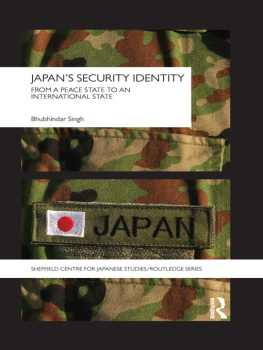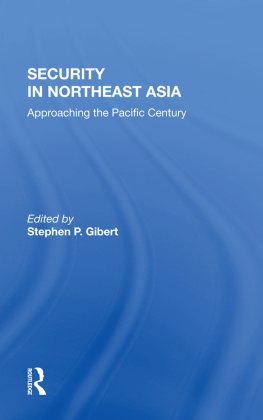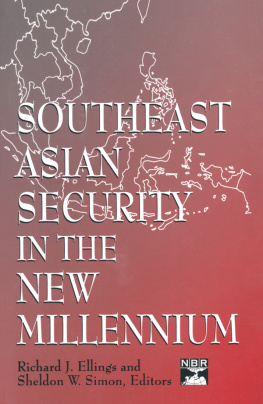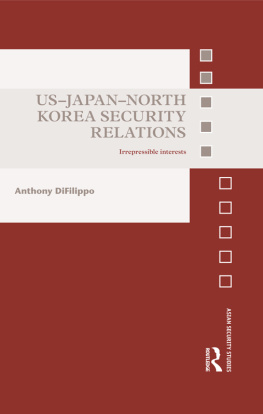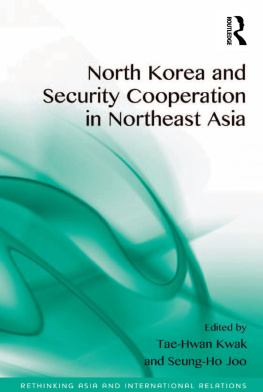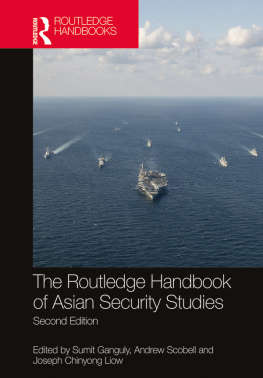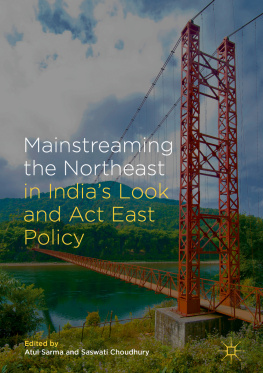First published 1992 by Westview Press
Published 2018 by Routledge
52 Vanderbilt Avenue, New York, NY 10017
2 Park Square, Milton Park, Abingdon, Oxon OX14 4RN
Routledge is an imprint of the Taylor & Francis Group, an informa business
Copyright 1992 by the Institute for EastWest Studies, New York
All rights reserved. No part of this book may be reprinted or reproduced or utilised in any form or by any electronic, mechanical, or other means, now known or hereafter invented, including photocopying and recording, or in any information storage or retrieval system, without permission in writing from the publishers.
Notice:
Product or corporate names may be trademarks or registered trademarks, and are used only for identification and explanation without intent to infringe.
Library of Congress Cataloging-in-Publication data
Youtz, David, 1960-
A Northeast Asian security regime: prospects after the Cold
War I David Youtz and Paul Midford.
p. cm.(Public policy paper ; 5)
Includes bibliographical references.
ISBN 0-913449-31-8 (IEWS): $9.85. ISBN 0-8133-8626-8
(Westview): $9.85
1. Security, International. 2. Asian cooperation. 3. East
AsiaForeign relations. 4. East AsiaMilitary policy. 5. Soviet
Far East (R.S.F.S.R.)Foreign policy. 6. Soviet Far East (R.S.F.S.R.)
Military policy. I. Midford, Paul. II. Title. III. Series : Public
policy paper ; no. 5.
JX1569.Y68 1992
327.17095dc20
92-11117
CIP
ISBN 13: 978-0-367-01098-0 (hbk)
The success of the Conference on Security and Cooperation in Europe (CSCE) in helping end the Cold War has given fresh impetus to the study of multilateral security systems. The Soviets had been proposing such a regional system for Asia since the 1960s, but observers usually dismissed their suggestions as, at best, unworkable, or, at worst, propaganda. But after Mikhail Gorbachev called for a Conference on Security and Cooperation in Asia (CSCA) in 1986, the idea gradually began to receive more serious attention.
David Youtz and Paul Midford, the authors of this study, assess early Soviet CSCA proposals, as well as the refinements Gorbachev introduced after his own first call in his 1986 Vladivostok address. Youtz, formerly the director of Asian Programs at the Institute for East-West Security Studies (now the Institute for EastWest Studies), and Midford, a former Institute research assistant, analyze the obstacles that remain before such a system could even emerge, let alone succeed. They suggest that the establishment of security regimes on a subregional level first would foster the eventual development of a security regime for Asia as a whole. The authors conclude with practical recommendations for effecting such a subregional grouping in Northeast Asia in the wake of the demise of the former Soviet Union.
The Institute for EastWest Studies would like to express its gratitude to the Ford Foundation for its support of the Institutes Asia Program and for funding this publication. We would also like to thank the John D. and Catherine T. MacArthur Foundation, the Rockefeller Brothers Fund, the William and Flora Hewlett Foundation, and the Scherman Foundation for their continued support of Institute programs.
John Edwin Mroz
President
Institute for EastWest Studies
May 1992
We would like to express our gratitude to Peter Volten, Ian Cuthbertson, and Reneo Lukic, our colleagues at the Institute for EastWest Studies, and Professor Peggy Falkenheim of Simon Fraser University, British Columbia, for their helpful feedback on earlier drafts of this paper. We also thank Rosalie Morales Keams and Fred Wiemer for their editorial assistance.
In addition, Paul Midford would like to express his gratitude to the Research Institute for Peace and Security in Tokyo for its generous support of his work on the final revision of the manuscript.
I
Introduction
For more than two decades, the USSR promoted the idea of multilateral security cooperation in Asia. Under Mikhail Gorbachev, this was referred to as a Helsinki process for Asia or a Conference on Security and Cooperation in Asia (CSCA) to parallel Europes CSCE. Until the end of the 1980s, such an idea was frozen along the lines of the Cold War. East Asian governments dismissed the idea of a CSCA as Cold War propaganda or, at best, an untransferable European concept ill-suited to East Asia.
East Asian skepticism toward the notion of a CSCA has not disappeared, but it is clear that the long-term security arrangements of the region will have to be adjusted in accord with the end of the Cold War, the lessons of the Gulf War, and the complete disintegration of the Soviet Union. In East Asia, the end of the Cold War has brought a revolution in regional diplomatic relations, movement in long-frozen conflicts, and the virtual elimination of the Soviet military threat. These shifts have been welcome in East Asia. However, as in post-Cold War Europe and the former Soviet republics, abrupt change has raised new potential for regional instability and conflict. Doubts about the US commitment to the regions security, rising friction between the US and Japan, and the decline of Soviet power have raised fears of an East Asian power vacuum and the resurgence of regional rivalries. With these uncertainties and new concerns, a multilateral forum focused on security is again receiving serious consideration in the East Asian region and could well come into being during the 1990s.
This paper assesses past Soviet CSCA proposals and the direction in which they developed until the disintegration of the Soviet state. We then discuss the remaining shortcomings of the CSCA concept that prevent its realization and acceptance by the nations of East Asia. We analyze the current prospects for the development of a regional multilateral security regime for East The paper concludes with practical policy recommendations on how the regime should be realized in the new post-Soviet world order.
Past Soviet proposals unnecessarily complicated and hindered the development of the new security structure they sought in East Asia. The first problem was nomenclature: the terms collective security and Helsinki process for Asia were problematic for several reasons, and in the future should be replaced with a more accurate, less tainted phrase. Second, the history of Soviet proposals was itself a liability. New proposals, however serious, must overcome the suspicions raised by those offered during the Cold War. Third, the region to be included under such an arrangement has yet to be defined: Will it include all of Eurasia? East Asia? Northeast Asia? Fourth, does CSCA mean different things to the different supporters of the idea, and can these visions be reconciled? Do the principal skeptics of a CSCA in the region-the United States, Japan, and China-have the same conception of a CSCA as the supporters?
Key questions remain unanswered: How soon should a regional security regime for East Asia develop? What would be the alternatives? What form should a CSCA take and which countries should be included? Finally, what steps can the principal nations of the region take to help move the process forward? The goal of this IEWS Public Policy Paper is to recommend the most practical answers to these questions.
Note
. Throughout this paper, Northeast Asia refers to Japan, North and South Korea, Mongolia, China, Hong Kong, and Taiwan. East Asia includes the countries of Northeast Asia and Southeast Asia (Brunei, Indonesia, Malaysia, the Philippines, Singapore, Thailand, Vietnam, Laos, Cambodia, Burma, and Papua New Guinea) and Australia and New Zealand. Asia refers to the still broader geographical area including all of East Asia, Oceania, the nations of the Indian subcontinent and west to the Middle East, as well as Russia and the Central Asian republics of the Commonwealth of Independent States.




